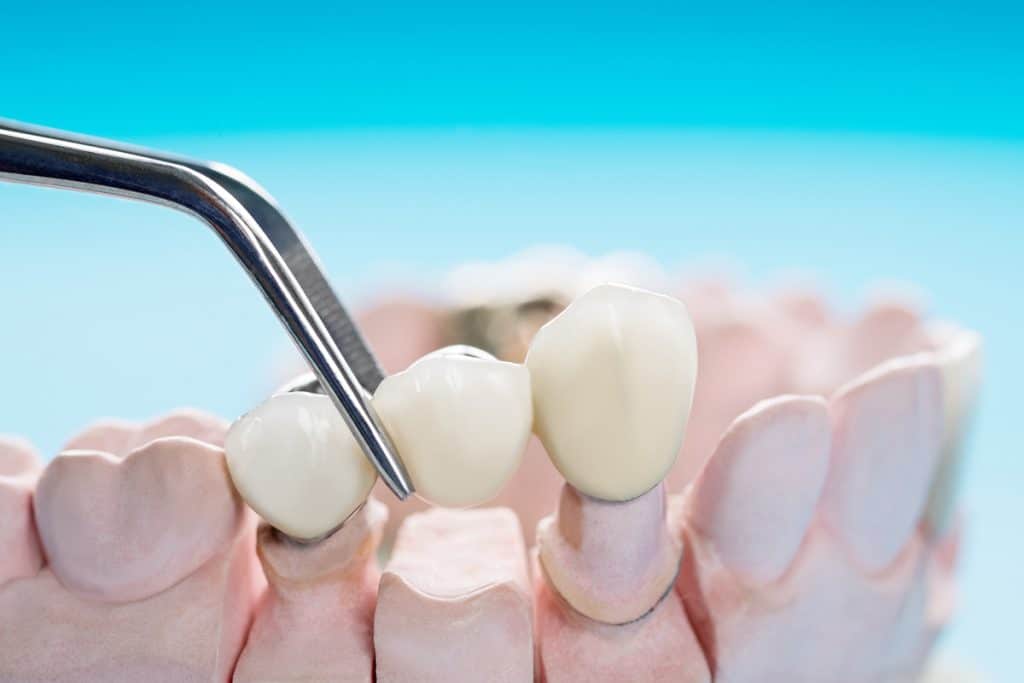How Long Do Dental Bridges Last?

Are you missing one or more of your adult teeth? From dental decay to accidents, tooth loss has many potential causes.
Luckily, if you’re missing teeth, you may also have several treatment options to consider. One such option is dental bridges.
Asking questions about any treatment for missing teeth before deciding a particular option is right for your needs is always smart. For example, along with wishing to learn more about what dental bridges consist of, you might also want to know how long you can expect a dental bridge to last.
What You Need to Know About Dental Bridges
As its name suggests, a dental bridge is a false tooth or set of teeth that bridges the gap where a single tooth or multiple consecutive teeth are missing. Dental bridges come in these forms:
- Traditional dental bridge: A traditional dental bridge consists of a pontic or multiple pontics (the technical name for replacement teeth in a dental bridge). A dentist cements two crowned abutments to the adjacent teeth on either side of the pontics. These abutments support the bridge.
- Cantilever bridge: The support structure in a cantilever bridge only attaches to one tooth adjacent to the gap in a patient’s mouth. While this places more stress on the supporting tooth, a cantilever bridge may be a viable alternative to a traditional bridge if the tooth on one side of a gap isn’t healthy enough to provide the necessary support.
- Implant supported bridge: A dental implant may provide more support for a dental bridge than a natural tooth could provide. If a patient is missing multiple teeth, a dentist might recommend an implant supported bridge instead of a traditional bridge, as this option also has minimal impact on the teeth adjacent to a gap. However, this treatment option is more invasive and time-consuming.
- Maryland bridge: Rather than cementing abutments to the teeth adjacent to the gap in a patient’s mouth, a dentist could offer a Maryland bridge, which involves cementing a metal support structure to the back of a patient’s teeth. The Maryland bridge treatment procedure is less invasive than that of a traditional dental bridge, but a Maryland bridge is not as strong.
There’s no single type of dental bridge that’s perfect for every patient. Discuss your options with a dental professional for more information about which may be best for you.
How Long Does a Dental Bridge Typically Last?
The lifespan of a dental bridge can vary depending on several factors. That said, according to one 2012 study from the Journal of Dentistry, approximately 72% of dental bridges remain in good condition for at least 10 years.
Important Factors Affecting How Long a Dental Bridge Lasts
Again, many factors can play a role in the lifespan of a dental bridge. They include:
- Oral and dental hygiene habits: Brushing, flossing, sticking to a healthy diet, and seeing your dentist at least once every six months all contribute to your overall health. Maintaining proper dental and oral hygiene habits can also optimize the lifespan of your dental bridge by preserving the health of the tissues that support it.
- How many teeth you are missing: In a study from the Journal of Oral Rehabilitation, researchers found that shorter dental bridges tend to have higher survival rates than longer bridges.
- Your lifestyle: Sports accidents and other such accidents can result in damage to a dental bridge. If your lifestyle puts you at a relatively high risk of being involved in such accidents, your dental bridge may not last as long as someone else’s.
- Type of dental bridge: Implant supported bridges may last longer than other types of dental bridges. Traditional bridges may also last longer than Maryland bridges, which are typically weaker.
Many of the factors influencing the longevity of a dental bridge are within your control. By prioritizing your dental health and coordinating with your dentist, you could optimize your bridge’s lifespan.
Tips for Boosting the Lifespan of a Dental Bridge
Along with practicing sound oral hygiene habits and seeing your dentist on a regular basis, ways to keep your dental bridge in the best shape possible for as long as possible include the following:
- Eat the right foods: A balanced diet contributes to overall oral health. Additionally, refraining from eating hard or sticky foods could guard against damage to a dental bridge.
- Use your teeth for chewing: This may sound like a no-brainer, but it’s important to consider how you might sometimes use your teeth for such tasks as opening bags or packages without realizing this can damage them. Using your teeth as tools may also damage a dental bridge.
- Minimize nervous chewing and teeth-grinding: Chewing your fingernails, pen caps, or other such items may result in a dental bridge wearing down earlier than expected. Grinding your teeth can have the same effect. Try to be conscious of these habits, and make an effort to avoid them.
The main point to take away from this post is that a dental bridge could serve as a fairly long-term replacement for your missing teeth. With proper care, a dental bridge may restore your smile for a decade or more. You can also discuss replacing a dental bridge with your dentist when or if yours ever does wear down.
Learn More About Dental Bridges in Greer, South Carolina
At Greer Dental Studio, we’re always happy to answer patients’ questions about dental bridges and other treatment options for missing teeth. Contact us online or call us at 864-259-2590 today to request an appointment.
